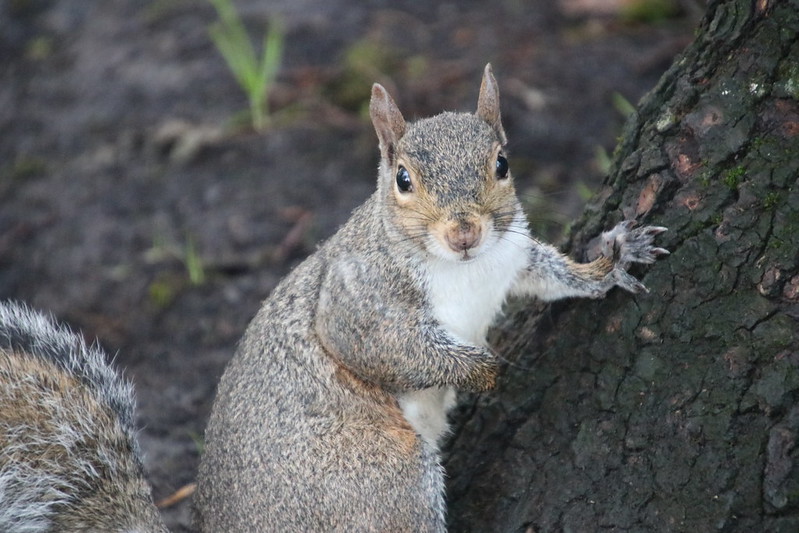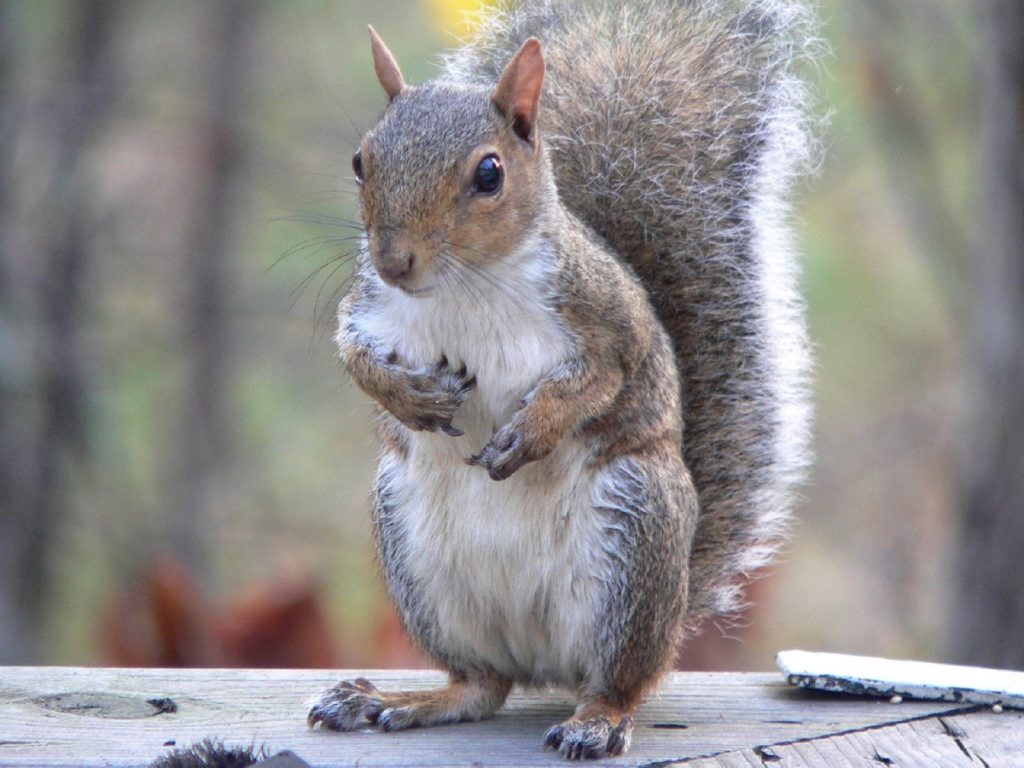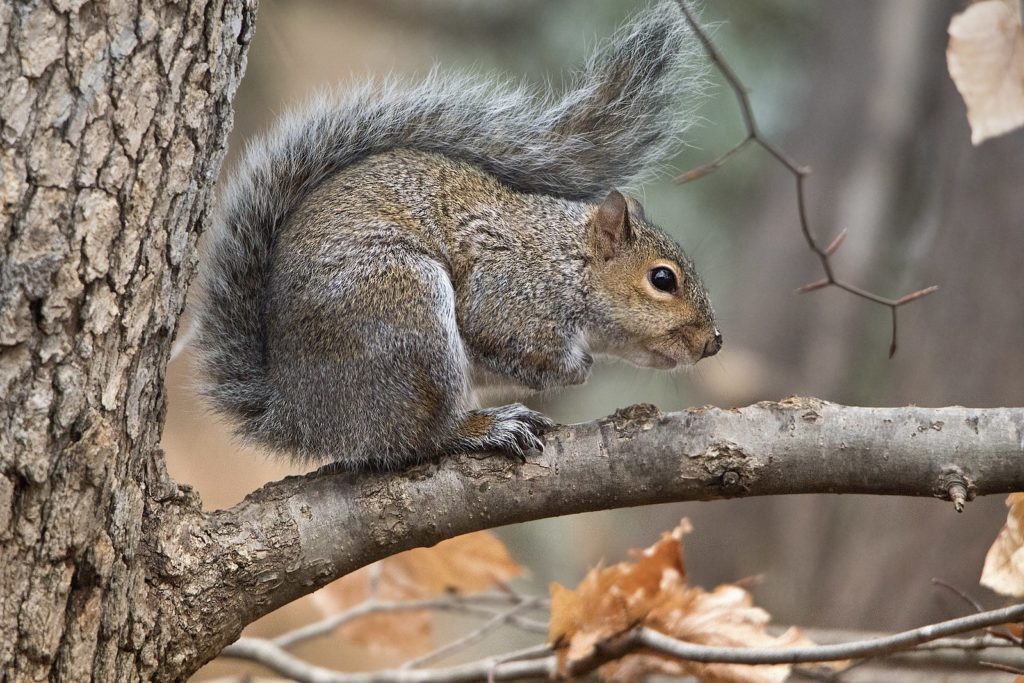Almanac: Mind Of A Squirrel

Eastern gray squirrel (Sciurus carolinensis). Photo: Creative Commons
As those who read my piece on black squirrels know, I have something of a love/hate relationship with eastern gray squirrels. They can be an incredible nuisance, or downright destructive. Nonetheless, I am continually surprised by the cohort inhabiting my backyard. Not long ago, for example, the temperature was in the single digits but, despite the cold, four squirrels were active on my big burr oak. Some were sunbathing—flattening themselves, head-down, on the sunny side of the trunk. Others were climbing/scurrying in pairs, probably males chasing females since one of the two mating seasons for these critters is roughly during January and February.
Because they are so abundant and easily observed, squirrels afford us humans an opportunity to really watch carefully and notice small details of behavior that open an (admittedly small) window into the mind of a squirrel. We can never know what’s really going on in even another human’s mind, so how much less can we divine about what’s going through the mind of an squirrel? These are dicey waters for an empiricist, but, still, the exercise of imagining what might be going on inside the mind of another creature can be, I believe, both legitimate and enjoyable. That, in fact, is one of the great capacities of Homo sapiens…the ability to imagine. The squirrels, I think it’s safe to say, cannot imagine what it’s like to be a human. We, however, can at least attempt to imagine what it might be like to be a squirrel.
What would it feel like to be able to climb so easily on trees? To be as comfortable being upside down as rightside up? What would the world look like with eyes placed on the sides of the head rather than front facing? I’m not going to pursue those musings here, as fun as they might be, but I’ll sketch some findings from people who study squirrels for a living that shed a little light on squirrely behaviors.
These days my lawn is full of small holes dug by squirrels looking for nuts they buried last fall. The name for this strategy is “scatter hoarding.” This is where an animal buries many small caches of food in different locations (unlike, for example, chipmunks, which use only one—or only a few—food stockpiles). Since the squirrels can’t guard their caches, they scatter things around to minimize the potential loss if another animal (likely another squirrel) finds a particular buried stash. That, anyway, is the official line from the literature. I’m here to tell you that gray squirrels are perfectly capable of laying up sizeable stashes of food (e.g., dozens of black walnuts) if they find a protected place (e.g., my attic).
Squirrels are also keenly aware of potential thieves when they bury their loot. A study of grey squirrels in England found that if a squirrel was aware of another squirrel in the vicinity, it was much more likely to turn its back on the other squirrel while burying food, and would bury food in a more dispersed way. Such behavior was not observed when crows or magpies were nearby. Squirrels have also been observed using “deceptive caching”—basically an attempt to fake out other squirrels by pretending to bury a food item while holding it in their mouths all the time. I find that fascinating—I mean…really? There’s enough going on inside those wee brains of theirs to deliberately deceive? It’s hard to resist imagining the thought process: “Damnit, Fred’s over there watching me. Nosy guy. Well I’ll show him…I’m just gonna pretend to bury this here acorn…la dee da…here I go…and he can’t see that I’ve still got the nut in my mouth…the sap! OK…done…all buried. Ha! Not. Now I’ll just leisurely walk away and bury this little beauty somewhere else.”

I often see busy squirrels suddenly stand up, front paws drawn close to their chest. They don’t turn their heads to scan the scene, they just stand, frozen, for a few seconds or more, then they either scamper off or resume what they were doing. They adopt this “vigilant posture” when they detect a potential threat. They don’t need to turn their heads because they have an approximately 280-degree field of view (ours is barely 180 degrees). They can also focus a scene across their entire retina. Humans have highly focussed vision only in the small area of the retina called the fovea, which means we have to scan scenes, either by moving our eyes or our whole heads, in order to get a good view of things.
In addition to their wide-angle eyesight, squirrels have excellent hearing and use that capacity in a surprising way. A study conducted in Oberlin, Ohio, found that gray squirrels listen to “bird chatter” as an “all clear” signal. When the “chatter” stops or is replaced by alarm, or “sentinel” calls from such birds as robins, chickadees, and tufted titmice, the squirrels assume the vigilant position. The authors concluded that the squirrels were “eavesdropping” on the birds to increase their ability to detect a threat.

Another obvious squirrel behavior is also the one most difficult to interpret. Often a squirrel will vigorously twitch its tail, rather than simply holding it against its back or in a relaxed position. Tail twitching, however, can mean many things, including as a signal to other squirrels of a potential threat; a “come hither” sign by males looking for a mate; a sign by males warning other males to stay away; and a warning to predators that the squirrel is aware of their presence and is, thus, on guard.
Knowing all of this stuff hasn’t transformed me into a total squirrel lover, but does soften my heart a bit toward these creatures that can be so easy to hate because of their aggressive pilfering of bird feeders or habit of gnawing holes in walls or roof eaves. They’re just squirrels being squirrels, right? Um…yeah…right. Maybe.
Almanac is a regular Indy column of observations, musings, and occasional harangues related to the woods, waters, mountains, and skies of the Pioneer Valley. Please feel free to comment on posts and add your own experiences or observations.

Before writing biting comments, I should always remember to look for and read Almanac.
Such a calming, thought-provoking pleasure: glad — this week, at least — that you’re back!
Thank you. I’ve noticed all the same you have. I’ve studied my local population of eastern grays for at least 8 years now and I’ve seen population after population and many similarities in possibly relative squirrels. One thing I’ve found fascinating! is the ability of a squirrel ?️ to actually have enough of a mindset to craft presents/gifts and leave them for us as a way to say thanks for the little extra help this winter or other seasons. It doesn’t happen often and is rare but I’ve seen examples from stolen sea shells left by squirrels for me, flowers not native to my area surroundings places straight where I would leave food, I’ve had crafted pine cone projects and bark laid out in a very precise and project like manner. I will always Love my local squirrel population and as one man told me one time when I asked does he think it’s ok to feed them and he said, “yes they’re unemployed after all” I had a big laugh about that.
I believe they are employed in fact in their own circles. I’ve watched them meeting each other in the morning and going who knows where returning only for lunch and dinner. Long live the beautiful Eastern Gray!
Great comments and observations Dan! Thanks!
update on Sarah Silverman’s observation that squirrels cannot find 80% of the nuts they hide, which leads to an unexpected benefit for forest ecosystems, courtesy of AI
While Silverman’s observation makes for great comedy, the actual science is more nuanced. Squirrels don’t simply forget their stashes – several factors contribute to why nuts remain buried:
Natural Factors
Squirrels often fall prey to predators before retrieving their cache
Other squirrels and animals frequently steal cached nuts
Some nuts rot or are consumed by insects and worms
Nuts may germinate before squirrels return to retrieve them
Memory Capacity
Rather than forgetting 80% of their stashes, squirrels actually have impressive spatial memory and may only forget about 20% of their hidden food.
The remaining nuts are lost to other environmental factors.
This behavior creates an elegant ecological partnership between squirrels and trees. Trees benefit from this relationship through seed dispersal strategy: trees deliberately overproduce seeds every few years to overwhelm the local squirrel population. This strategy, known as predator satiation, ensures that enough seeds remain in the ground to sprout into new trees, even after accounting for those consumed by wildlife.
The process demonstrates a remarkable example of natural symbiosis, where what appears to be forgetfulness on the squirrels’ part actually contributes to forest regeneration and expansion.
This all makes good sense and I appreciate all the detail Ira! It would be weird for squirrels to have such a selective, and significant, memory impairment! Thanks for writing…
It would be even more interesting if squirrels remember where their nuts are buried, and then bury their next cache in another place!
Hint to wildlife biologists: that’s an experiment just waiting to be done, if it hasn’t been done already….